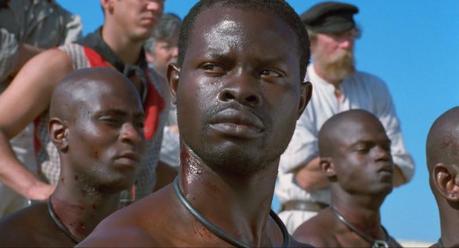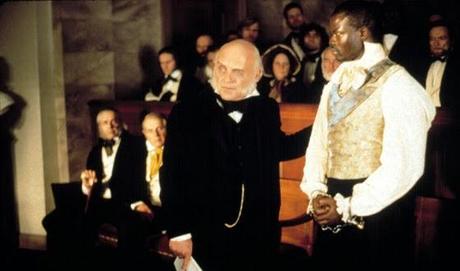 Amistad (1997) is Steven Spielberg's most schizophrenic film. When focused on its central story - the plight of 53 slaves tried for piracy and murder - it's remarkably powerful. But Spielberg dilutes its power through endless subplots and digressions. Amistad feels overstuffed and undercooked, tackling too many topics with regrettable lack of depth.
Amistad (1997) is Steven Spielberg's most schizophrenic film. When focused on its central story - the plight of 53 slaves tried for piracy and murder - it's remarkably powerful. But Spielberg dilutes its power through endless subplots and digressions. Amistad feels overstuffed and undercooked, tackling too many topics with regrettable lack of depth.In 1839, African slaves led by Cinque (Djimon Hounsou) overtake the Spanish slave ship La Amistad and sail it to America. They're imprisoned by American authorities, initiating a complex legal battle. President Martin Van Buren (Nigel Hawthorne) frets over his reelection, fearing the incident will antagonize the South. Abolitionists Tappan and Joadson (Stellan Skarsgard and Morgan Freeman) ask lawyer Roger Baldwin (Matthew McConoughey) to represent Cinque, but Baldwin's case is foiled by government manipulation. Eventually it rises to the Supreme Court, where Baldwin enlists ex-President John Quincy Adams (Anthony Hopkins) as his secret weapon.
On a surface level, Amistad remains impressive. Inevitably, many critique Amistad's historical accuracy, but the period recreations and scenes of slaves speaking Mende add enviable authenticity. Spielberg fares best with Cinque's slaves, giving them agency and humanization without predictable White Liberals to the Rescue clichés. Even in confinement Cinque defies his guards and mocks Baldwin's legal tricks. Compared to Spielberg's distant, halting treatment of slavery in Lincoln it's a nice achievement.
Certainly Amistad can't be accused of sanitizing its topic. The nightmarish opening, with Cinque's men hacking the Amistad's crew to death with machetes, is a mere curtain-raiser on a harrowing experience. Cinque's testimony provides a horror show few mainstream Hollywood movies dare approach: he's kidnapped, imprisoned on a ship, watching fellow slaves whipped to death or, worse, murdered en masse. Spielberg effectively contrasts these atrocities with cool courtroom logic; a ship's logic reduces hundreds of humans to excess ballast. It makes Schindler's List look like Barney and Friends.
Outside these scenes however, Amistad takes Spielberg's penchant for overstatement to absurd extremes. The nadir comes when Cinque interrupts one hearing, repeatedly screaming "Give us free!" From Spielberg's close-ups to John Williams' swelling soundtrack it should be Amistad's highpoint. But the staging borders on grotesque, practically demanding the audience be moved. Similarly, Adams final speech would work better if not underscored with pompous music. And do we really need Cinque and a fellow slave reading a Bible, then comparing themselves to Christ?
 But Amistad's fatal flaw is David Franzoni's script. Franzoni tries to make a grand statement on not only the slave trade but antebellum America. Hence digressions on Van Buren's reelection, latent North-South tensions, diplomatic finagling with Spain, the Royal Navy's campaign against slavery. It's admirable that Spielberg and Franzoni try approaching their story from so many angles. Devoting a single scene to each topic, however, not only renders them superficial but smothers the central drama.
But Amistad's fatal flaw is David Franzoni's script. Franzoni tries to make a grand statement on not only the slave trade but antebellum America. Hence digressions on Van Buren's reelection, latent North-South tensions, diplomatic finagling with Spain, the Royal Navy's campaign against slavery. It's admirable that Spielberg and Franzoni try approaching their story from so many angles. Devoting a single scene to each topic, however, not only renders them superficial but smothers the central drama.Worse, Spielberg borrows the Judgment at Nuremberg approach to characterization: players with more than two minutes' screen time become walking thesis papers. Hence Pete Postlethwaite's blustering prosecutor, Arliss Howard's defiant John Calhoun and Tomas Milian's craven diplomat. But at least they make an impression. Nigel Hawthorne's screen time (and depth) roughly equals Anna Paquin's preteen Queen of Spain; Morgan Freeman just glowers soulfully, scene after scene. Only the slaves seem like real people.
Accordingly, Djimon Hounsou (Gladiator) dominates Amistad. Throughout Hounsou is soulful and fiercely intelligent, portraying Cinque as a man of action scarcely restrained by enslavement. It's an amazing star turn. Anthony Hopkins gets great mileage out of Adams' cranky idealism, delivering his monologues with gusto. Poor Matthew McConaughey can't help seeming out of place. Baldwin's cynic-idealist arc never really comes off; we're not sold enough on his amorality to buy his conversion.
Amistad is a curiously strangled epic, simultaneously too big and too small. Either Spielberg should have focused on Cinque's horrific story, or expanded it into a miniseries or full-blown epic. Instead we get an unworkable compromise, promising greatness Amistad only fleetingly delivers.

